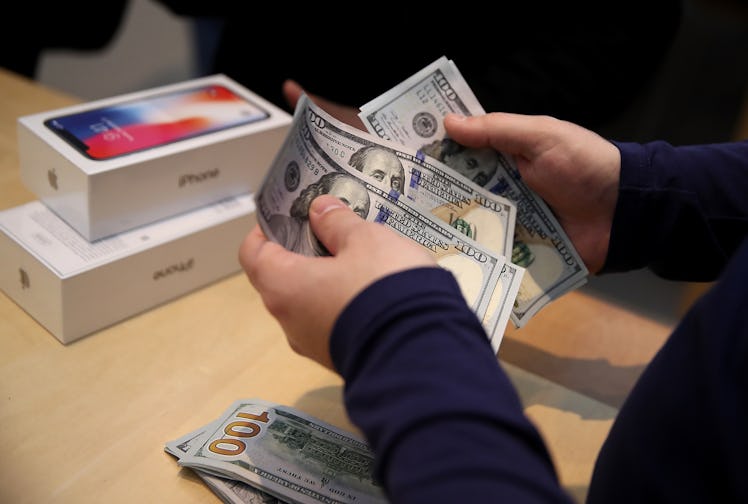
Apple Is Being Sued For Slowing Old Phones Down, So Yikes
Few things make me happier than the release of a new iOS update (when it comes to technology, anyways). The promise of faster-working apps, new emojis, and pesky bug fixes usually make up for deleting all of my iMessages just to have enough storage space to install the update. Recently, though, some owners of older-version iPhones had their suspicions of manipulated dwindling battery life and poor phone performance all but confirmed by Apple. In response, there have been two class-action lawsuits filed, and you might be wondering, "Why is Apple being sued?"
Elite Daily reached out to Apple but has not heard back by the time of publication.
The answer to that question of why Apple is being sued originates from a statement that Apple made on Wednesday, Dec. 20. Apple explained that iPhones with older batteries might not be operating at their peak performance because Apple is limiting how much power an iPhone processor can draw in certain situations, according to Business Insider. This action that can result in limiting the processor's peak performance is taken to help prevent older iPhones from suddenly turning off, according to Apple.
Two lawsuits have emerged from this revelation. The first federal lawsuit, which was filed in Chicago on Thursday, Dec. 21, claims that Apple utilized "deceptive, immoral and unethical" business practices. The suit that was filed on behalf of five customers (owning iPhones ranging from iPhone 5 to iPhone 7) claims that the iOS updates "were engineered to purposefully slow down or ‘throttle down’ the performance speeds," according to The Chicago Sun-Times. Apple's statement to Business Insider indicated that their reasoning was to prevent the device from unexpectedly turning off.
The second lawsuit, which was also filed on Thursday, was filed in Los Angeles by Stefan Bogdanovich, according to Business Insider. Bogdanovich's suit focuses on iPhone 7 owners, and it claims that Apple slows down the older iPhones in an effort to force customers to buy the upgraded phones. Apple did not cite this as the reason for their limiting of processing power.
Apple's reasoning, once again, has to deal with the lifespan of a battery. The tech giant asserted that if an iPhone attempts to draw more power from the battery than it is capable of, then the phone will simple shut down. Since older batteries are less powerful, Apple decided it best to limit the power a processor can draw in order to prevent an unexpected device shutdown as the company described to Business Insider:
Last year we released a feature for iPhone 6, iPhone 6S and iPhone SE to smooth out the instantaneous peaks only when needed to prevent the device from unexpectedly shutting down during these conditions.
Expanding on the operational capabilities of a Lithium-ion battery (that is used in the iPhone), Apple stated that they expect an iPhone to get three years of use since rechargeable batteries have an expiration date — that explains why my iPhone goes from 50 percent to the red zone after, like, five minutes of Snapchat selfies...
Apple also shared that the optimal functioning temperature for the battery is between 32 and 95 degrees Fahrenheit — so when you take your iPhone on icy winter runs or on vacation to a tropical getaway, you might want to keep an eye on the thermometer.
Apple hasn't commented on the lawsuits, but if you have noticed that your phone is slowing down, you can always replace your battery for a fraction of the price of a new phone. An new Apple battery only costs $79, and there is data that backs up claims that it could make your phone run much faster. Since it's a new battery, its lifespan will be longer, too — so go ahead and Snap all the flower crowns and reindeer antlers your camera roll can handle.
Check out the entire Gen Why series and other videos on Facebook and the Bustle app across Apple TV, Roku, and Amazon Fire TV.